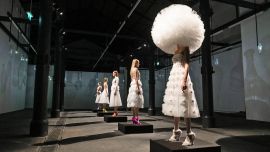Two nuns and seven other female employees accused of complicity in years of sexual abuse of minors at the Antonio Próvolo Institute for Deaf and Hearing Impaired Children in Mendoza Province were acquitted by a court Wednesday of sexual abuse and rape.
The ruling, broadcast on public television, concluded a trial of two-and-a-half years in a case that has shocked the home country of Pope Francis.
This is the second trial in the case for crimes committed between 2004 and 2016 at the Próvolo Institute. In November 2019, Horacio Corbacho and Nicola Corradi, two priests in charge of children at the centre, were jailed for more than 40 years each for sexual abuse, including rape, of some 20 minors.
The victims were aged four to 17 when the crimes were committed from 2004 to the closure of the institute in 2016.
The institution's gardener, Armando Gómez, has also been jailed for 18 years for sexual abuse, and a former altar boy pleaded guilty to the sexual abuse of five children.
Several staff were taken into custody after allegations of abuse first surfaced in 2016, and the institute was shut down.
This latest investigation focused on the alleged abuse of 11 victims. More than 400 hearings were held and more than 100 witnesses gave evidence. It is the second 'megatrial' of three related to abuse at the centre, which until the time of the allegations was considered one of the best centres specialising in treatment for language disorders and hearing impairment in the country.
In the dock were Japanese nun Kumiko Kosaka and Paraguayan nun Asunción Martínez, as well as former cook Noemí Paz, psychologist Cecilia Raffo, legal representative Graciela Pascual, school director Gladys Pinacca, and three other employees, Valeska Quintana, Laura Gaetán and Cristina Leguiza.
Kosaka stood accused of aggravated sexual abuse and covering up the crimes, and Martinez of "corruption of minors," among other alleged offences.
A panel of three judges – Gabriela Urciolo, María Belén Salido and María Belén Renna – on Wednesday acquitted Kosaka, Martínez, and all seven others.
Ariel Lizarraga, father of one of the accusers, described the outcome as "total injustice."
"There were already convictions. The facts happened," he told reporters, accusing the Catholic Church of conspiring to "clean up the stain" of abuse allegations that has rocked the institution worldwide in recent years.
"There is economic protection, from the Church, from the Vatican, from the religious community. They wanted to clean the stain of previous convictions," alleged Lizarraga.
He said there was “sufficient evidence” to justify convictions and that the families had only been “waiting for justice.”
The Catholic Church has been shaken by a string of child sex abuse scandals in recent years; in the United States, Europe, Latin America and Australia.
Founded in 1995, the Próvolo Institute offered free education to children of modest origins who had hearing and speech difficulties, with on-site boarding during the school week.
Prosecutors had sought sentences of 25 and 10 years respectively for the nuns, 18 for the legal representative, Graciela, Pascual and lesser sentences for the rest.
Defence lawyers said they would appeal the ruling all the way to the provincial and national Supreme Courts if necessary, as well as the relevant international bodies, once the grounds for the ruling had been released.
"If the same statements were used as evidence in previous convictions, in which the kids told how they were handed over to be abused, and said they talked to them and did nothing, why is it not enough [evidence] to convict them now?" defence lawyer Lucas Lecour told the AFP news agency.
For the lawyer, "the only explanation is that the judges did not understand the kids' statements from a perspective of disability. They did not understand deaf culture. Or maybe something worse, which I will see in the grounds.”
Lizarraga complained that the three judges of the court"had no consideration for the victims, who now look like liars.”
“They always told the truth. They didn’t lie, these facts happened," he declared.
– TIMES/AFP/NA
























Comments